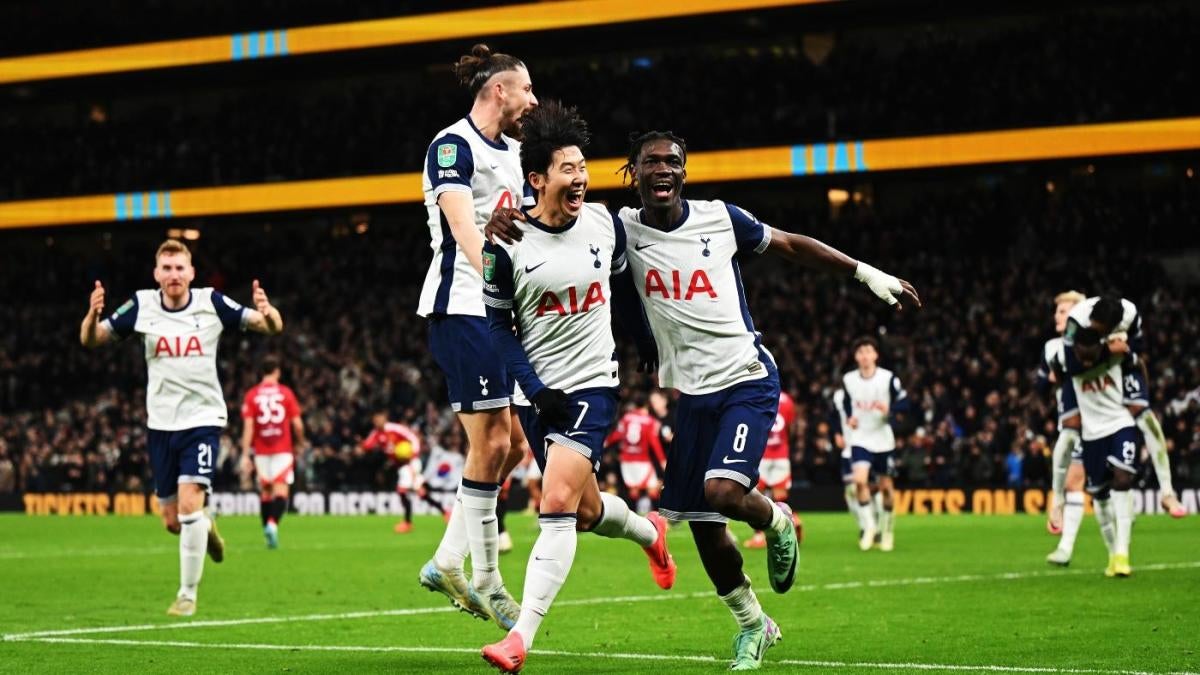Tottenham Hotspur’s strengths outweighed their weaknesses on Thursday, nearly relinquishing a three-goal lead to beat Manchester United 4-3 and advance to the EFL Cup semifinals for the first time in three years.
For about 60 minutes, Ange Postecolgou’s side looked like they were cruising to a comfortable victory. Dominic Solanke’s brace and a goal from Dejan Kulusevski gave the hosts a 3-0 lead by the hour mark, though the lead was far from the only sign that Spurs’ attack was firing on all cylinders. By the 60th minute, they had eight shots to United’s seven but put five shots on target and boasted 1.19 expected goals while the Red Devils were yet to put a shot on frame and had a paltry 0.31 expected goals to their name.
Somehow, that lead was barely enough to make it to the final whistle as the winners. United took six shots in the next 20 minutes and finally put three attempts on target, generating 1.82 expected goals all while Tottenham failed to take a single shot in that time. It marked a drastic change for United’s otherwise unimpressive attacking effort, but the visitors were dealt quite the helping hand by the opposition defense. Goalkeeper Fraser Forster, the understudy to injured starter Guglielmo Vicario, made several mistakes at the back that cost his side two precious goals and set up for an unnecessarily nervy finish to the game.
The momentum seemingly favored United after Forster gifted Amad Diallo with United’s second goal in the 70th minute, but a game of twists and turns offered one more shortly before the final whistle. In Spurs’ first shot since Solanke completed his brace in the 54th minute, Son Heung-min scored directly from a corner to ensure his side would come out on top and play in their first semifinal since the 2021-22 season. United nicked one more goal off a mistake from Spurs, with Jonny Evans scoring in the fourth minute of stoppage time.
The back-and-forth game was ultimately a showcase of contrasts in more ways than one. Postecoglou’s entertaining, attack-minded approach was Spurs’ true selling point, much as he designed it. Though United nearly doubled their shot count, it was Tottenham who looked more intentional in front of goal, putting six of their nine attempts on frame. The goalscorers themselves are examples of Spurs’ strengths, too – Solanke has been a strong addition and already has 10 goals this season, while Kulusevski continues to make a case as their player of the season and a sneakily good finisher with his sixth goal and eighth assist of the campaign. Son, meanwhile, remains a reliable option in attack for Spurs and hangs onto his reputation as someone with a flair for a stylish goal.
The high-scoring nature of the game, though, raises some concerns about the team’s current defensive stake. It is a problem that will seemingly be solved once the injury crisis ends – Spurs were without starting goalkeeper Vicario and center backs Cristian Romero and Micky van de Ven, their replacements failing to seamlessly slot into the lineup. The combination of Radu Dragusin and 18-year-old Archie Gray, who is not a natural centerback, meant Tottenham were unable to play successfully out of the back all night long. Forster, though, remains a bad tactical fit for Postecoglou’s style of play, as two of United’s three goals demonstrate.
The performance offered another sign that Spurs are not the finished product under Postecoglou, which may not be a surprise for a project that only began a year and a half ago. To evolve, they will need to build convincing depth across the pitch, not only in defense. The reason their attack excelled is because their first choices were available, and it remains difficult to identify who would be the next player who would convincingly play a meaningful role.
That said, if this is what Spurs’ attack can drum up in a high-profile and wacky match, then it is a strong sign that Postecoglou’s tactical vision works. He has faced some external pressure with only two wins in their last nine games heading into their EFL Cup clash, but Postecoglou has shown some tactical range by letting opponents lead the shot count but still coming out on top thanks to efficient attacking work, as their previous wins against Manchester City will demonstrate.
Spurs’ progress amidst imperfection is not just an example of contrast between them at full-strength and half-strength, though. It offers a stark reminder that United have so much work to do to even compete at this level. Thursday’s loss, coupled with a 2-0 loss to Arsenal earlier this month, demonstrates that it is too early for them to come up with statement wins, but they were equally defensively sloppy as Spurs, and not for the first time in the last year and change. An equally glaring issue, though, is their misfiring attack – they scored three goals chiefly off of mistakes from the opposition defense and mustered just five shots on goal from 20 attempts. Wasteful does not begin to describe United’s performance, and one coaching change midseason will not fix those problems anytime soon.

